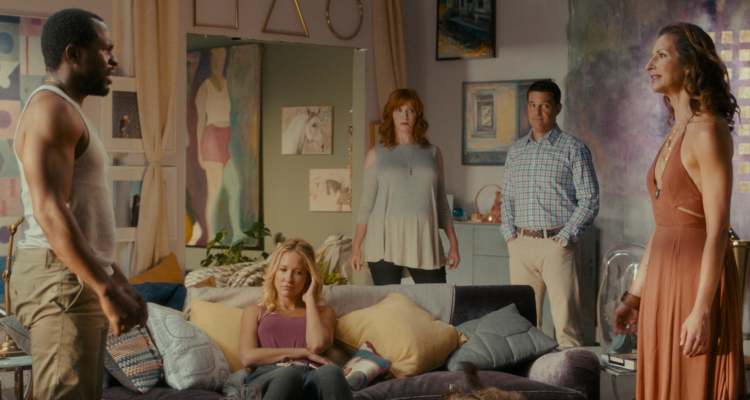With this sharp satire, director Marianna Palka continues poking and prodding at the various phases of women’s lives. In her 2008 directorial debut “Good Dick,” she took aim at dating with its anti-romantic comedy approach. Her 2017 pitch-black offering “Bitch” explored the life of a stay-at-home mother and wife who is so fed up with her treatment by her cheating husband and misbehaving kids that she begins acting like a vicious dog. With “Egg,” Palka makes what could be a thematic prequel to “Bitch” as its characters dissect the many decisions around pregnancy, childbirth, and the gender roles of raising children.
When Karen (Christina Hendricks) visits her art school friend Tina (Alysia Reiner), the stark contrasts between the two are immediately clear. Karen and her husband, Don (David Alan Basche), are fast approaching the due date of their first child, and they take a traditional approach to pregnancy and parenting. Meanwhile, Tina and her husband, Wayne (Gbenga Akinnagbe), are forging a different path to parenthood. Tina is a conceptual artist and as a part of her upcoming ambitious show on motherhood, she is using Wayne’s friend Kiki (Anna Camp) as a surrogate for their baby. Over the course of an afternoon at Tina and Wayne’s Brooklyn loft, they discuss the merits of each couple’s choices as well as the larger philosophical debate around women and their relationships – or lack thereof – to motherhood. When Kiki finally appears, clad in cutoffs and bemoaning her belly, the day takes an unexpected turn.
“Egg” has the air of a stage play, with most of the film composed of people talking in a single location. But there’s real attention paid to the visuals, beyond just production designer Sally Levi‘s detailed, lived-in creation of an artist’s loft and studio. As director of photography, Zelmira Gainza shoots the space with warmth and strong framing, keeping it from feeling like you’re watching a filmed theatrical piece with no sense of the cinematic medium.
Palka’s last film, “Bitch” had an equal satirical bite to this one, but it was intentionally over the top in its depiction of behavior and choices. Here Risa Mickenberg‘s screenplay does amplify the absurdity of its characters and their situations for effect, but all five people in this film seem as though they could really exist, though you might not want to know them in real life. “Egg” may be making a statement, but the interaction between Karen and Tina largely is authentic, as their dynamic moves between long-simmering competition, outright animosity and sympathetic support. It all works due to Hendricks and Reiner’s performances, who offer emotional grounding to the comedy. Akinnagbe, Basche, and Camp are each hilarious, but the two leads make “Egg” both funny and real.
The satire focuses not only on women’s own relationships to motherhood but also on how they’re judged, regardless of what their choices are, in every aspect of it. That judgment comes from all angles: other women, their partners and themselves. “Egg” deserves credit for shedding a special light on women who actively choose not to be mothers, a subject that might be growing on women’s sites but still isn’t often depicted on screen. Despite all the judgment of these characters by other characters, “Egg” itself refuses to do the same to them. It may poke fun at Karen and Tina, but it never says that their choices around motherhood aren’t valid and deserving of happiness. Its ultimate sympathy for these women may be at odds with earlier jabs at them, but it creates an empathetic space that is surprisingly emotionally satisfying. [B]
Follow along with all our 2018 Tribeca Film Festival coverage here.

